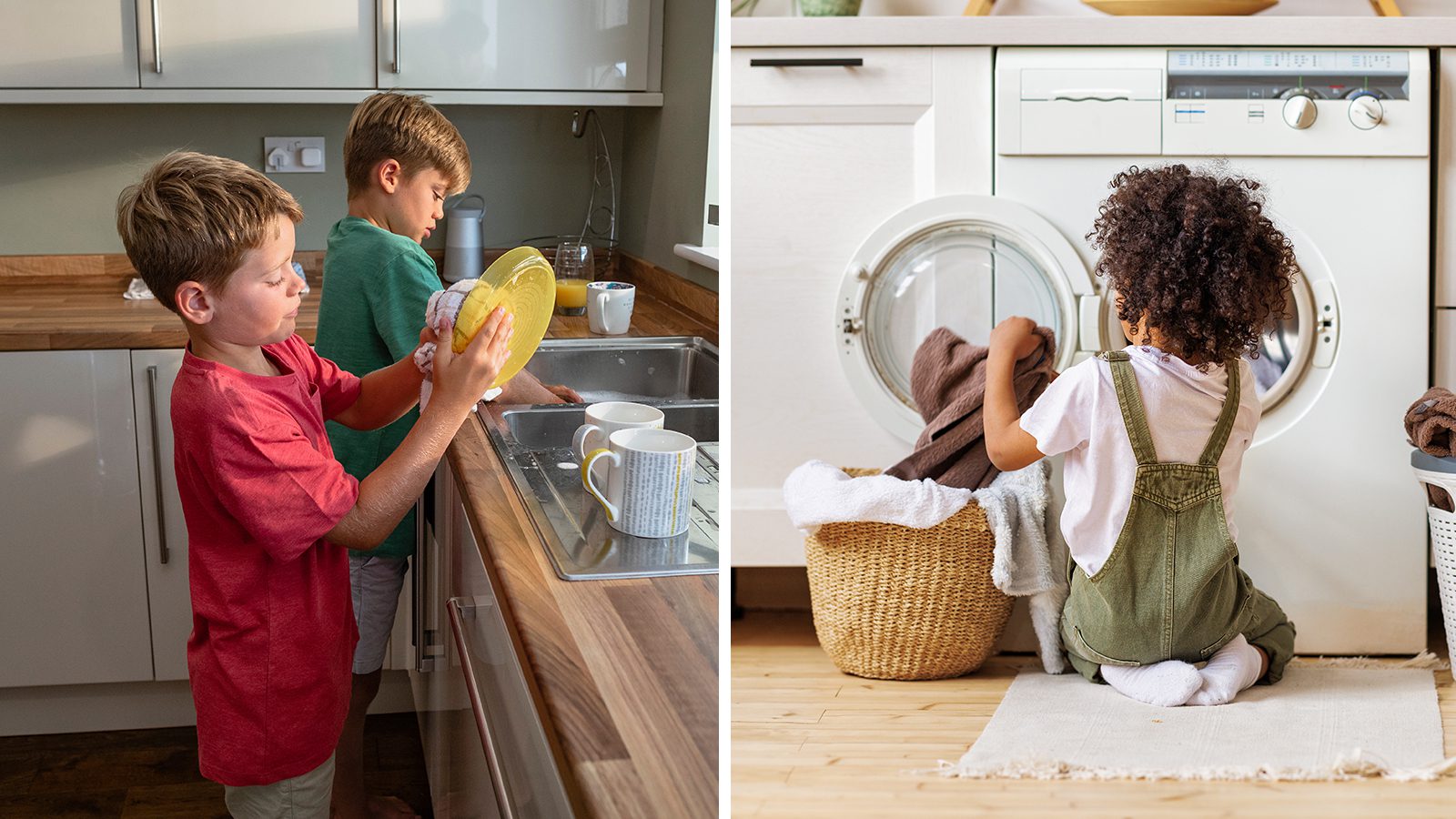Today’s parents try to do as much for and with their kids as possible. They’re encouraged to play, constantly entertain, and chauffeur them all day. It’s expected that parents check their kids’ homework and keep their lives as stress-free as possible. But parents who help their children become self-sufficient also guide them to grow up to be kinder, more responsible adults.
Decades ago, parents expected their kids to play independently, do their homework without help, and contribute to household chores without question. Of course, today’s world differs from what it was thirty years ago.
Teaching your child to be self-sufficient helps them achieve these eight things.
With the internet and social media, it isn’t easy to know how to encourage your kid to be independent and still protect them. Here are eight reasons self-sufficiency is so essential for a child and some simple ways you can promote your child’s independence.
1 – Self-sufficient children are also more self-reliant
Years ago, kids walked to school, rode their bikes to the grocery store, and independently worked out problems with friends. Researchers say these independent kids learned to rebound from difficulties and were more self-reliant and emotionally healthy than young people today. Teaching your child to be autonomous isn’t easy. They may choose to wear clothes you don’t like, but they will become better adults for it.
2 – Self-sufficiency helps them grow up to feel happier
Researchers say that kids feel more comfortable making meaningful contributions to the family when they grow up. Besides expecting your kids to participate in household chores, you can teach them simple household maintenance. Depending upon their age, kids can learn life skills such as how to
- Change a light bulb
- Mow the grass
- Clean a bathroom
- Spackle nail holes
- Paint a wall
- Use a screwdriver and a hammer
- Clean grout in the bathtub
- Wash a car
- Clean windows
- Replace air filter
Do these maintenance tasks with your kids. When you know they understand how to do the job safely, allow them to try it independently.
3 – Self-sufficient children are more self-confident
When a child learns how to do things, it builds their self-confidence. All you have to do is look at the face of a five-year-old who knows how to tie their shoes. You’ll see a big, self-confident grin. Their confidence motivates them to try other challenging tasks like cleaning their desks at school or making their bed at home.
4 – The children feel a sense of control over their life
Being self-sufficient also helps your child feel like they have some control over their life. Their world is small, but even simple things like being able to get dressed, clean up their room and come downstairs in the morning build a sense of control.
Be sure to praise your child’s effort, but avoid praising their performance. Studies found that praising a child’s ability is ineffective when a child fails compared to effort praise. Giving your child ability praise only causes them to act helpless and want to give up when they fail. They’ll become negative and give less effort to trying again.
But when you give your child effort praise, they focus on improving their process, showing more persistence and tenacity. Effort praise puts your child in a growth mindset, developing skills by working hard. Researchers say that when a child hears even a tiny amount of ability praise, they reduce their persistence, whereas a child’s self-esteem is preserved when they hear even a tiny amount of effort praise.
5 – Self-sufficient kids are more sensitive toward others
When a child can take care of their own needs, they want to help others. They feel confident that they can help. Your child’s learning experience is fresh in their mind, so they want to help somebody else learn what they learned. Reinforce this desire by giving them opportunities to help someone else through what they know how to do. For instance, you can allow your child to
- Help a younger sibling tie their shoes
- Show a young sibling how to make their bed
- Cut flowers and take them to your neighbor
- Help you bake cookies and drop them off for a grandparent
6 – Self-sufficiency increases their self-motivation
Self-sufficient kids are motivated academically. They have a sense of accomplishment and a desire to keep trying. As mentioned, it helps your child praise their efforts rather than all the correct answers. Even if they got some wrong, praise them for trying their best. Don’t make grades the primary importance. Instead, recognize their hard work. This helps them be even more motivated the next time.
7 – Learn how to take care of themselves
Kids who learn to do things for themselves feel capable of caring for themselves. A self-sufficient five-year-old starts kindergarten knowing how to put on their coat and tie their shoes. A five-year-old who hasn’t learned to be autonomous needs help to put on their jacket and tie their shoes. Both kids head off to school, but one child is ready to care for themselves. These children will feel more confident about themselves. They’ll be capable of learning new things immediately, whereas the other child must be encouraged to be more self-sufficient in caring for themselves.
8 – Self-sufficiency reinforces lessons about life and people
When kids earn the freedom to learn and try things independently, they walk away understanding life and people better. Researchers found that kids who help around the house have better relationships with their family when they’re adults than kids who didn’t help in the home growing up. Self-sufficiency sets your kids up for learning experiences so they learn what works and what doesn’t work. These lessons are invaluable when they’re older.
How can you help your kids become more independent as they grow up?
Now that you know the benefits of helping kids become independent, here’s the question. How? Try these age appropriate tips.
1 – Give them chores
Give your child age-appropriate chores. When they’re little, they can learn how to
- Make their bed
- Put away their clothes
- Help clear the table
- Feed the dog
As your child gets older, you can increase their responsibilities. Of course, you may need to adjust your standards for what a “made” bed looks like. That’s okay. You can help them focus on doing a better job as they mature.
2 – Give an allowance
Earning an allowance helps kids learn more independence. One mother paid her young daughter a quarter if she cleaned her room but took away a quarter when the room was dirty. The daughter quickly learned she had more money cleaning her room than skipping it. Of course, not all parents like the idea of an allowance because kids might only do chores for a reward. It’s up to you to decide how and when to give your kids an allowance, but it is a helpful way to teach them self-sufficiency.
3 – Teach them how to save (and spend) money
Give your kids a piggy bank at an early age. Guide them on how to save and spend their money wisely. They can save birthday money or their allowance. Talk with them about the difference between needs and wants. Help them make purchases or encourage them to save for more significant investments.
4 – Self-sufficient children can get ready for school by themselves
Let your children dress, brush their teeth, and pack their lunch. Discuss setting out clothes and doing homework the night before and what good food choices are for their lunch. As they mature, teach them to set the alarm and get up independently. They might have a day when they miss the bus or forget their lunch, but that’s all part of the learning experience of self-sufficiency.
5 – Allow them to do tasks alone
When your child is old enough, giving them some freedom is essential. Allow them to ride their bike to your neighborhood playground with their friends. Of course, years prior, you prepared them for how to handle things like not talking to strangers and how to cross a street. So, when it’s time to do it on their own, they’re ready, and you can trust them to do the right thing.
6 – Allow your child to work out conflicts themselves.
You can’t be there for every interaction your child has with other kids, but you can give them the skills they need to work out conflicts independently. Teach them to deal with their emotions, tell others they don’t like something, and apologize when needed. These skills will serve them and help them resolve conflicts when they grow up.
7 – Let them fail
As parents, it’s difficult to watch your child fail. You want to “fix” it for them, but failure is essential to your child’s growing up years. Don’t overreact when they fail, nor should you minimize it to the point where they don’t feel the pain of failure. Failure is a beautiful catalyst to try again. Help your child understand that failure is typical and that what you do with your failure counts.
Final thoughts on helping children grow up to be self-sufficient
When your kids are young, wanting to do everything for them is easy. This is partly because it’s easier. After all, you’re an adult, but sometimes you want them to be little kids and not grow up. Since growing up is inevitable, you might as well teach your child to be self-sufficient. Most researchers will tell you that self-sufficient kids are more confident, happier, helpful, and motivated. This can help your child grow into a robust and capable adult ready to help others and take on the world.

















 Community
Community

